LANDSCAPE SCALE CONSERVATION IN THE TRANS PECOS
From Mule Deer to Minnows
By Charlie Barnes
“A grassroots effort is underwayto bring the land’s majesty back to life.”
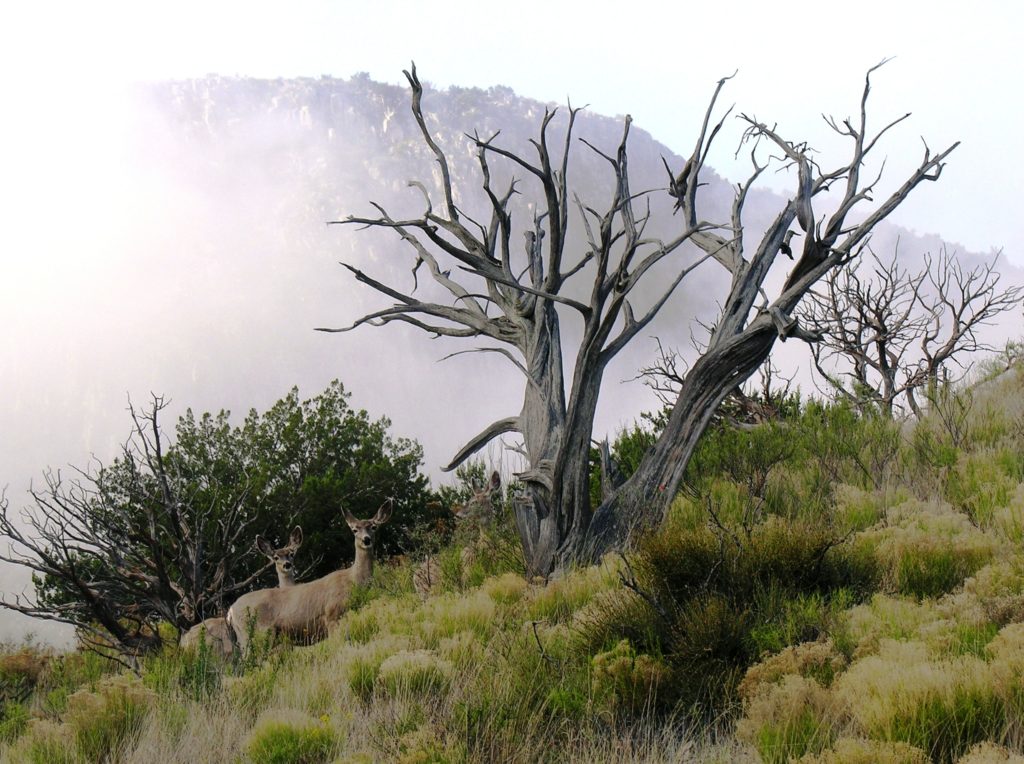
The Big bend Region of Texas is a magical land with a colorful history. From Judge Roy Bean, who history tells us once shot a man for snoring, to the great Chief Victorio, known to some as Lone Wolf, who led the Chiricahua and Mescalero Apaches from New Mexico south down to Mexico and westernTexas,the Big Bend Region ofTexas is scattered with larger-than-life legends.
It’s no secret the “old west” is a rich legacy of history, where traces of yesteryear hang heavy in the air, but perhaps even more notable than the land’s rich history, is the region’s breathtaking landscapes. Venture into the Big Bend region and elsewhere in this glorious, almost forgotten, time- weathered corner of Texas, and you will feel the power of the land and revere its cactus- owered, cathedral mountains; you will revel in the majesty of its wildlife; and you will watch desert bighorns scale impossible cliffs, coveys of quail burst from improbable patches of cover and mule deer bounce effortlessly up the sides and crags of rock.
Most recently, a lot is being done to protect this beautiful land. A grassroots effort is underway to bring the land’s majesty back to life. Conservation partners like the Houston Safari Club are working diligently to assist the region’s wildlife which has been threatened, primarily due to the prolonged drought and changes wrought by the hand of man over the last century. Under the loose auspices of the Trans Pecos Conservation Initiative and others, the land’s time to rebuild has seemingly come.
Dawn couldn’t arrive soon enough as the morning light ooded over the beautiful desert sky island called Elephant Mountain Wildlife Management Area (EMWMA) out in the Big Bend region ofTexas owned by Texas Parks and Wildlife Department (TPWD). This iconic mountain is about 25 miles south of Alpine Texas. I was here, along with many others, to assist the historic capture and transfer of 40 mule deer does to the equally rugged and beautiful El Carmen Land and Conservation Company (ECLCC) Ranch and the adjoining Black Gap Wildlife Management Area (BGWMA) in southeast Brewster County. I say historic because TPWD has not conducted a mule deer translocation in Texas for over two decades! TPWD Trans Pecos WMA Project Leader Mark Garrett mentioned to me that “he can’t remember a time when there were plenty of deer tags available on the Black Gap and we needed to get back to those days.” As we stood in the cool mountain breeze and the stars around us started to dim, I couldn’t help but be amazed by how many of these very stars had miraculously aligned themselves in order for this event to happen.
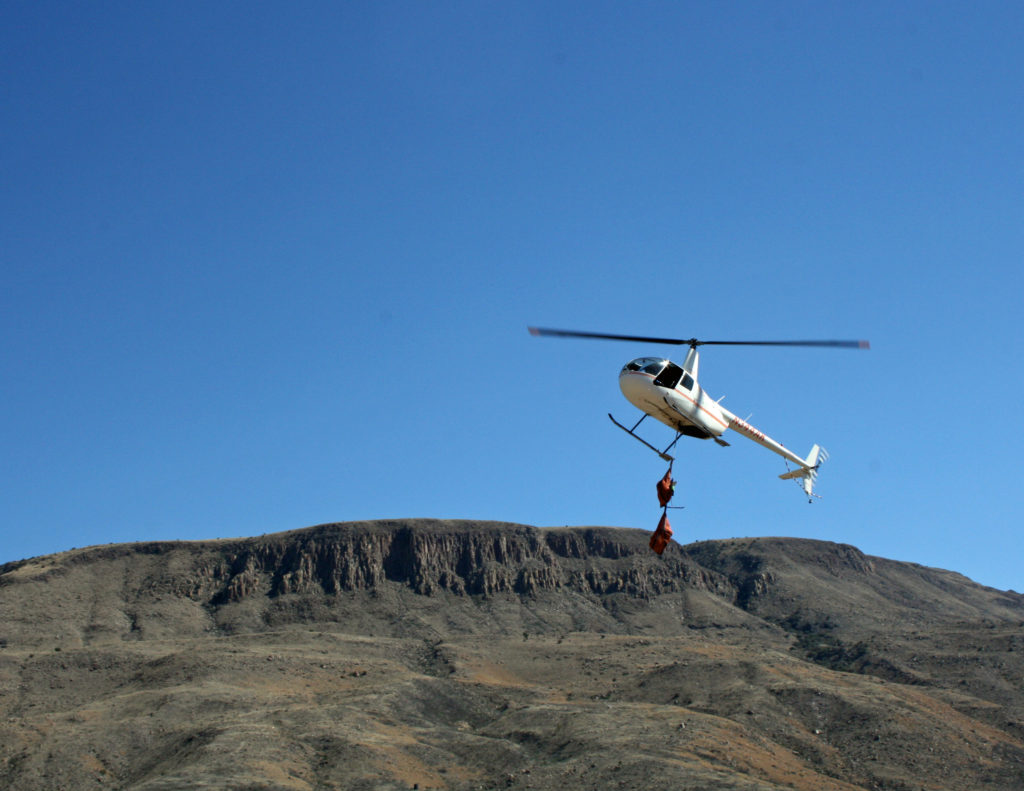
In 2006, a partnership between CEMEX USA and the Cuenca Los Ojos Foundation (CLO) purchased the old Adams Ranch, now known as the ECLCC.The partners signed a conservation easement on the property with the TPWF to restore and protect this critical wildlife corridor, a corridor which contains a major mammal dispersal on a transboundary level and is an important bird migration route in both the spring and fall. CLO was already heavily invested in conservation work on the western side of the Chihuahuan Desert along the New Mexico,Arizona and Sonora, Mexico borders, and aimed to “bookend” their efforts on its eastern boundary with the ECLCC property. CEMEX Mexico was also thoroughly immersed in a similar effort spanning in excess of 400,000 acres just across the border in the state of Coahuila.
Extensive work began immediately to restore the corridor’s natural habitat. Permanent wildlife water guzzlers were installed, implementing improvements to riparian areas which facilitate landscape connectivity and broad-scale rangeland restoration of native vegetation.This project served the full spectrum of native species including mule deer, desert bighorn sheep, migratory birds, quail, elf owls, black bears and even the endangered Rio Grande silvery minnow.
This project is“landscape scale conservation” of the highest order and it is obviously an undertaking of epic proportions that cannot be achieved without an extraordinary coalition of dedicated partners. The importance of building these relationships and the stability and promise they bring to an undertaking of this magnitude was recognized early on, and steps were taken to build mutually bene cial working partnerships to carry conservation here far into the future.
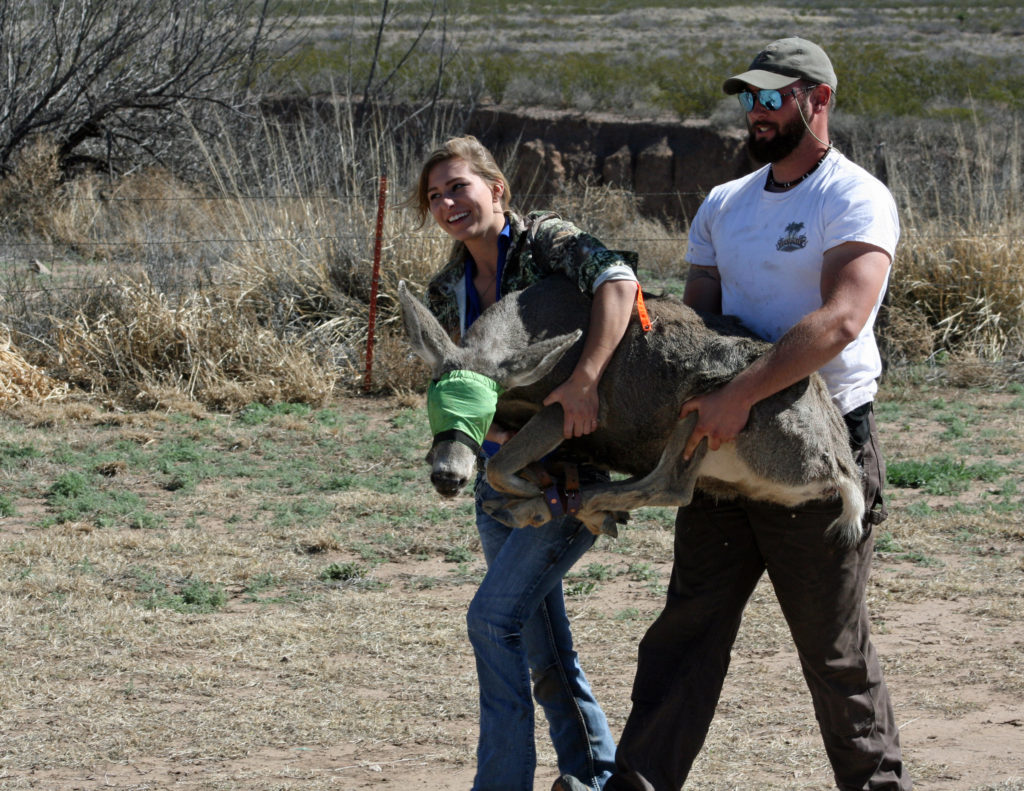
The Texas Bighorn Society (TBS) was an early partner. After this, a cooperative management agreement for bighorn sheep was inked between TPWD, ECLCC, El Carmen Mexico,TBS and the Wild Sheep Foundation to restore the land’s viable herbs. Next, the Dallas Safari Club and the Quail Coalition contributed more water guzzlers designed and strategically located to support a reintroduction of Gambel’s quail to the area. The Mule Deer Foundation (MDF) contributed to the telemetry research for the mule deer transplant and recently installed two ground guzzlers in preparation for the relocation.
CEMEX EL Carmen General Manager Billy Pat McKinney pulled me aside after construction of one of these guzzlers and asked me if I realized “that the last time there was permanent water on this site was when it was an inland sea a few million years ago?”
As the deer transplant came together, the Houston Safari Club stepped up to the plate in a big way.The Houston Safari Club contributed $30K for telemetry collars and related research to keep the multi-year transplant efforts on track, and to monitor its success. Sul Ross State University graduate student J.C.“Kiddo” Cambell will be doing his Master’s thesis on this work through the Borderlands Research Institute (BRI). BRI can always be counted on to put an army of volunteers on the ground for any conservation work done across this region and their involvement lays a strong foundation for developing the next generation of conservationists.
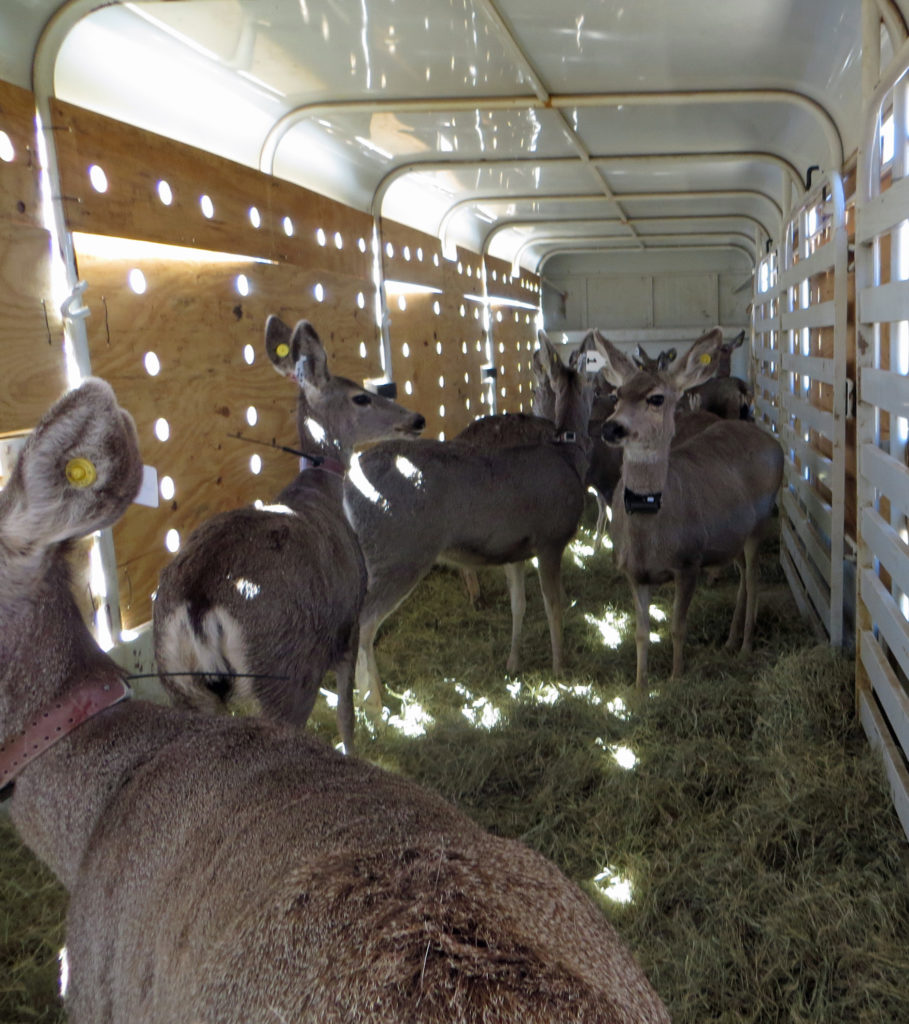
And of course, Texas Parks and Wildlife provides the science, standing and coordination to ensure that all our efforts are soundly designed and implemented to achieve effective conservation across the entire ecosystem.
There is a remarkable sense of Texas spirit and pride that permeates through the conservation projects done in this country. The look on volunteers faces at the end of the multi-day project, says it all. People came from hundreds of miles away and represented numerous organizations and backgrounds, brought together for one main cause. In the words of Josiah Austin, founding partner of the CLO Foundation, “I have never seen conservation work done better!”
Shawn Gray, who heads the Mule Deer and Pronghorn programs for Texas Parks and Wildlife Department, stated the case for doing this work in this area by pointing out to me the various types of vegetation at hand near one of our work sites. He explained as he pointed “This is Guayacan and this one is Texas kidneywood and those are Roemer acacia and spiny hackberry. These plant species are common throughout the area and are highly preferred by mule deer. “He also added that “the only thing that is missing to restore this land to prime habitat for mule deer is water. You have now resolved that issue right here and your future efforts will resolve it everywhere you put permanent water”.
Soon after dawn broke, all of the forty or so who had gathered to participate in this conservation adventure,enjoyed a wonderful action-packed day of mule deer being captured by the Quicksilver Air, Inc. crew. The masterful helicopter wildlife capture company team delivered them two-at-a- time to the headquarters below Elephant Mountain. There, an award-winning team of veterinarians, biologists, students and dedicated volunteers quickly processed the incoming animals, pulling DNA samples, administering inoculations, drawing blood samples, then radio collaring and ear tagging them for monitoring purposes in their new home. Soon the rst trailer was loaded for the two-hour drive to the ECLCC Ranch.
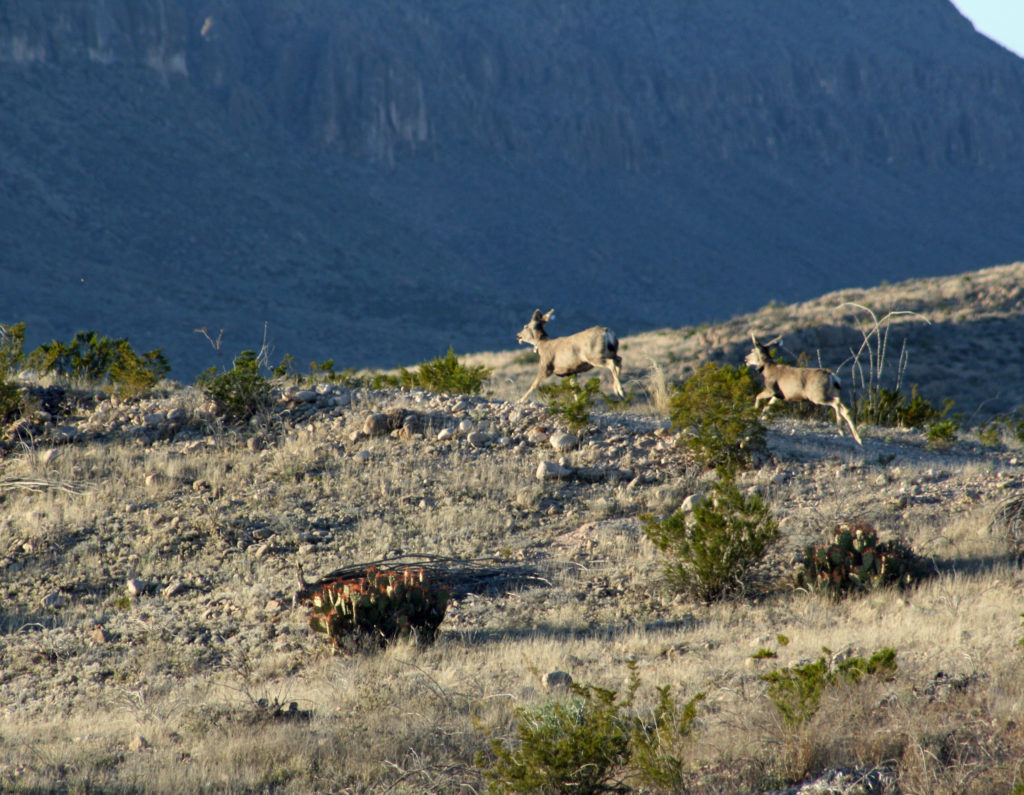
As daylight began fading on a historical day here at this wildlife oasis in the desert, Bonnie McKinney hurriedly arranged the volunteers into a blocking line on one side of the trailer. I slipped into position on a bluff above and opposite the trailer door and began to photograph as the rst deer timidly stepped out and paused to evaluate her new found freedom. After a few timid steps, she broke for high ground and then one after another her compatriots jumped out and made their getaway, stotting up and over a distant ridge to begin their assignment of replenishing the mule deer herd in this arid land.The next day the operation was repeated.
As I sat there photographing the last of these wonderful creatures topping out a nearby ridge, I could only imagine what was going through the volunteer’s heads. I wondered if their hearts were racing in their chests as mine was. I wondered if they too had a sense of da ja vu, recounting past hunting memories.
As a teenager, hunting mule deer in the Guadalupe Mountains of New Mexico, my brother David and I had found a little muley, button-head buck with his back leg hopelessly caught in a barb wire fence. Once David and I set him free, the deer stood on all fours, regaining his sea legs, and nally skittered his little self away, disappearing through the ocotillos, lechugees and Spanish daggers up the side of that desert rock mountain. It was one of those lump-in-your-throat speechless moments when these two grizzled, tough-as-nails brothers avoided eye contact with each other for the better part of half an hour to hide their emotions.As I think back to all the muley hunts David and I shared as kids, I have come to realize part of both of us had skittered up the side of that mountain with that little buck, and is still there to this day.
As my camera clicked the last photo of these desert muleys (or aptly nicknamed “Icons of the West,”) I felt part of me and every volunteer who had been part of this go over that rise with them. And they bounced triumphantly, destined to become a permanent part of this wondrous landscape where the Rio Bravo makes a big bend as it cuts through the sands of time, and where your spirit proudly mingles with those of legends gone before.
CEMEX USA, Texas Parks and Wildlife, the Cuenca Los Ojos Foundation, Borderlands Research Institute at Sul Ross State University, the Mule Deer Foundation, USDA Wildlife Services, and all of the other afore mentioned partners in this effort would like to express our profound appreciation to the Houston Safari Club for your commitment to this Trans Pecos Conservation Initiative Project!
DOWNLOAD LANDSCAPE SCALE CONSERVATiON iN THE TRANS PECOS ARTICLE (PDF)
